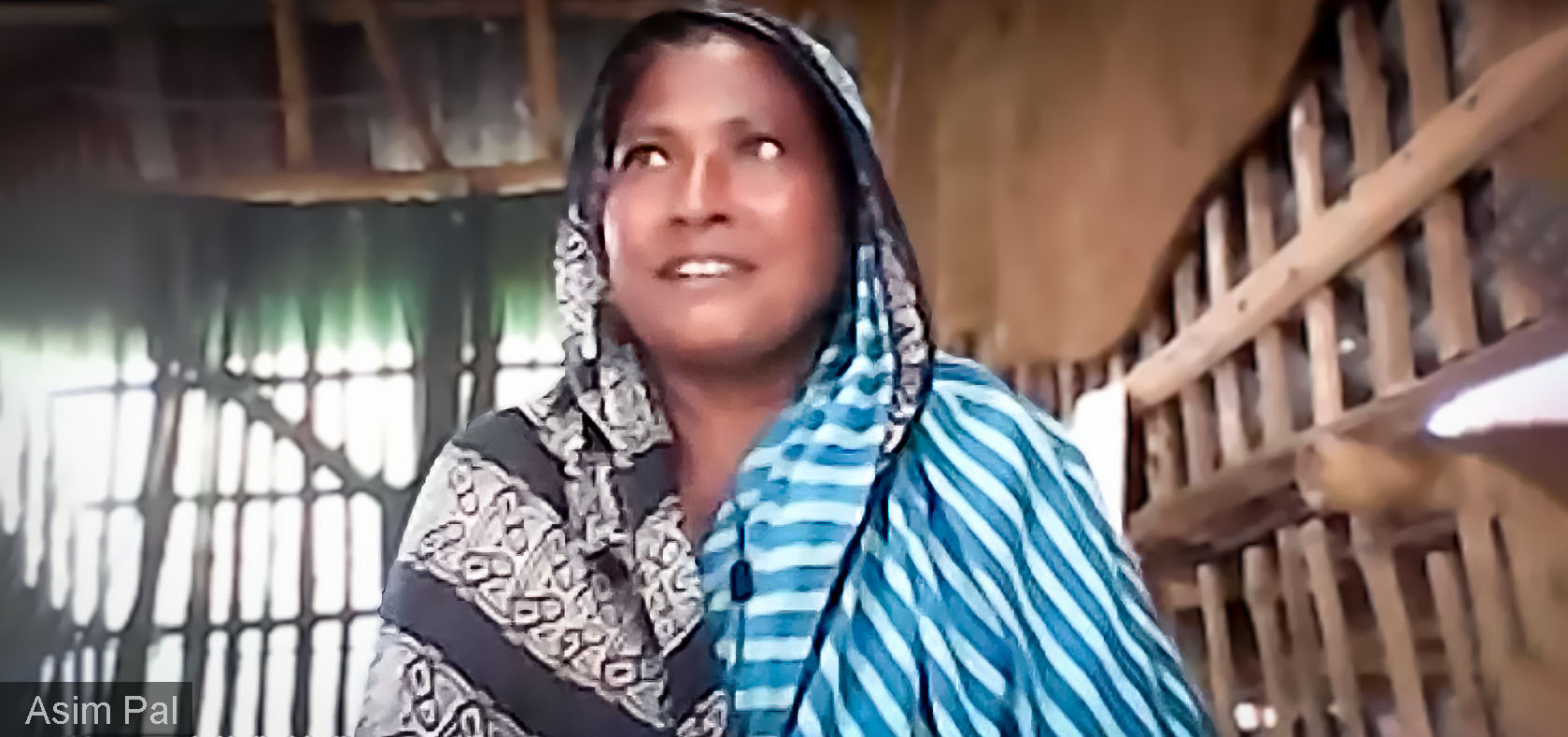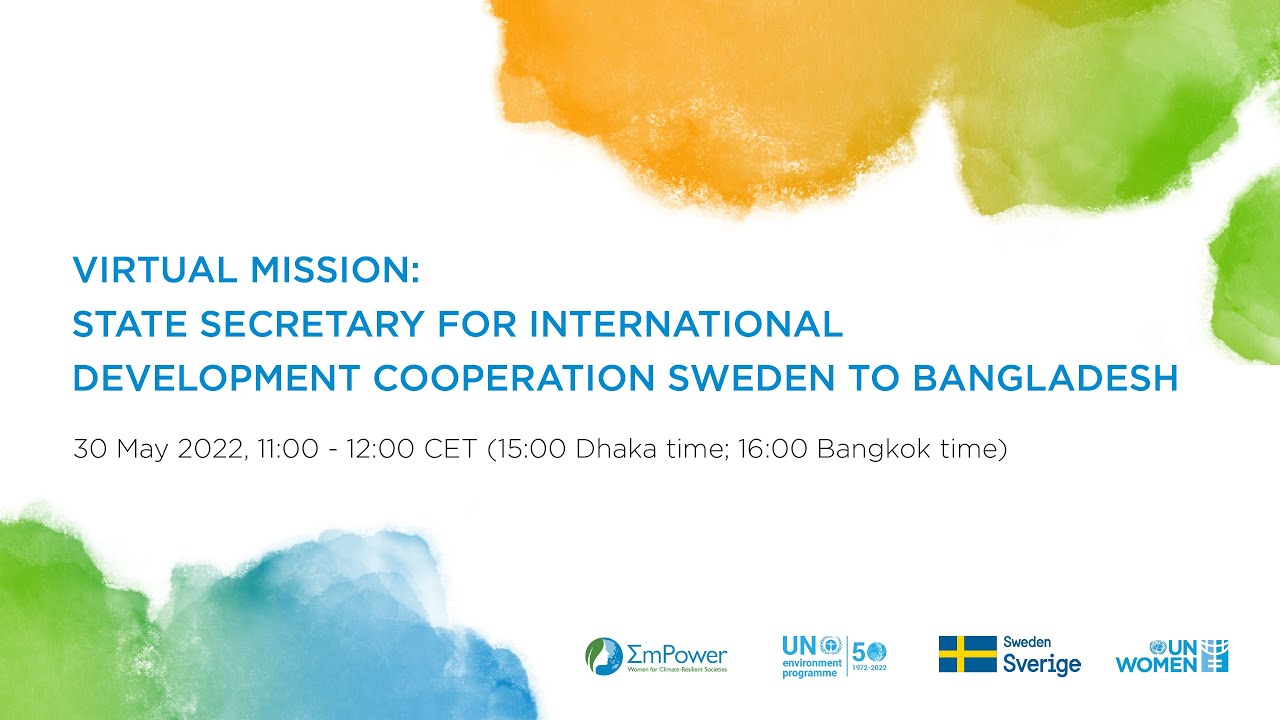Aid activists and a goat farmer tell of how a Sweden-funded project has changed lives in disaster-prone Bangladesh
Date:
Bangkok, Thailand — Women leading aid groups in Bangladesh have told senior Swedish Government officials in an online dialogue how much their work has benefitted from a Swedish-funded project that tries to protect women and girls from natural disasters.
But it was the story told by a female goat farmer that showed most vividly the difference that the UN Women and United Nations Environment Programme (UNEP) joint project, EmPower: Women for Climate-Resilient Societies, has made among people eking out a living from the unsympathetic earth.

Reti Khatun is a mother who lives in Kulpala village in Chuadanga, a district in southwest Bangladesh that is extremely vulnerable to climate change and long, devastating droughts in the summer. Her husband cannot work because of a disability, so she is the breadwinner of the family as well as caregiver. She used to clean houses for a living, but people stopped calling her during the COVID-19 pandemic.
Khatun joined in the 30 May video dialogue from inside her goat shed in Kulpala. Seen behind her were a slightly rusted tin roof and a piece of emerald-green fabric covering the walls of cross-hatching wooden slats, allowing beams of sunlight to filter through.
Sunlight has transformed Khatun’s life since she joined the EmPower project, which includes helping female entreprenours to acccess renewable energy technology, and finance and business skills, so they can build climate-resilient livelihoods.
From December 2021 to February 2022, with UNEP technical support, the project gave Khatun solar panels and a solar-powered pump to replace her noisy, smoky diesel pump, and trained her how to use these to make her work more environment-friendly, productive and cost-effective (no more electricity bills).
“Before the solar-powered water pump was installed, it was hard for us to control goat farming conditions,” Khatun said. “Now, we are able to cultivate 30 tons of rice, and arrange space, food, night lights, drinking water, and bathing facilities for our goats. This pump is helping us regulate everything related to goat-rearing.”
“Previously, we used to work in households, doing domestic chores. And now we’re involved in goat rearing, which is a much better trade for us. … We are able to send our children to school.”
Khatun’s success has inspired other women in her village to become entrepreneurs and strive for economic security.
“Many women from the community visit my farm to see how things are being done here,” she said. ”We will be able to train the others because we have also learned the skills and now we can transfer this to the other women.”
The EmPower project works to reduce the vulnerabilities of women and girls in the Asia-Pacific region, particularly in Bangladesh, Cambodia and Viet Nam. The five-year project ends in December.
The 30 May dialogue was designed to make more visible the results and impact of the partnership between UN Women and the Swedish Government. The Swedish participants included Jenny Ohlsson, the State Secretary for International Development Cooperation, and Alexandra Berg von Linde, the Ambassador in Dhaka.
“Much must be done to strengthen resilience of people and communities here [in Bangladesh].” Berg von Linde said. “We need systems to recover from the effects of almost yearly flooding and other risks. We also need capacities and resources to ensure that basic services, such as food and energy, are continually accessible to people, and that the livelihoods of families are secured.”
Also joining the dialogue were the heads of four of the 56 women-led grassroots civil society organizations that participate in the EmPower project and are the cornerstone of its success: Nari Associate for Revival and Initiative, Association for Alternative Development, Association for Integrated Development-COMILLA, and Trinamul Nari Foundation.
The four organizations help vulnerable people during disasters and try to create sustainable change by helping communities rebuild in more charitable, gender-equal ways. Their representatives spoke from Kurigram in northern Bangladesh, a district that is battered by flooding and river-bank erosion every year.
“We have learned from the EmPower project that the impacts of disaster on men and women are not equal, and that women are much more adversely impacted by any disaster,” said Rokeya Begum Shafali of Association for Integrated Development-COMILLA. “Therefore, any prevention and management initiative must be designed keeping in mind the unique needs of women and girls.”
Ivy Zinc and Zachary Mills contributed to this article.
